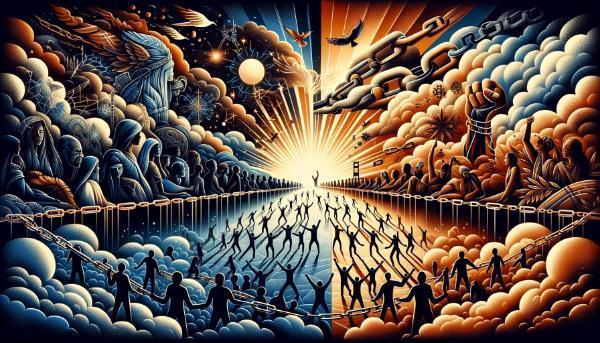Racism in the 21st century is as pressing a topic as ever. In order to understand its essence, discussions on racism often attempt to pinpoint its origins. They commonly trace these to the era of European expansionism and the slave trade in particular. Although this may seem a forthright conviction, it is in my opinion shallow, taking into account superficial history and neglecting psychology. Here I aspire to put forth an alternative view. In short, that racism has no historical origins whatsoever but rather is an inherent (albeit reversible) trait of human nature.
Before I spell out what I mean by that statement, it is necessary to clarify what I mean by racism. Racism comes in many shapes and degrees, ranging from subconscious aversive racism to outright militant racist supremacism. I use the term in its general form to refer to any conceivable type of racism; any sort of racially, ethnically, or tribally incurred otherism. In short, I define racism as any attitude that is not in scope panhumanistic.
This definition holds the key to explaining the above-stated premise of this discourse. It was the formulation of humanism as an ideology that led to the conceptualization of racism as its antithesis. Analogously, it was the enactment of law, based on the development of ethics, that induced the notion of crime. This does not imply that murder and theft did not occur before law labeled them crimes and penalized them; only that, in absence of morality, they were considered no more reprimandable or mention-worthy than among the rest of the animal kingdom. Likewise, prior to humanism, racism was but the unnamed, universally standard mode of intersocietal conduct.
Fundamentally, racism is nothing more than the social extrapolation of egoism. Humans are individuals, and selfishness is their paramount drive. Because their capacity for cooperation enhances the welfare of every involved individual, groupishness becomes their second-in-importance drive. The us-and-them view, which is as old as life itself, is the essential origin of racism.
Germane to our present discussion are groups as economic collectives: unilingual and unicultural associations that integrated the livelihoods of their members via division of labor: groups that gradually evolved from clans to nations and are now underway to coalesce into a terminal global civilization. The history of mankind is foremost the chronicle of interactions between such groups.
These interactions have principally been competitive. (Whenever consistent cooperative interactions transpired between any two groups, these eventually merged into one group). Human collectives grew steadily larger as the ideological and technological means needed to bind them together were achieved.
But regardless of size and trade… from bands of jungle cannibals, to professional Spartan warriors enslaving their helot neighbors, to hordes of steppe horsemen wiping out countries, to multiethnic armies of Crusaders pillaging heathen lands, to musket-bearing freebooters expropriating entire continents… all pre-humanistic groups of people readily mistreated the others without not only any scruples of conscience, but hardly a hint of elementary empathy.
The more different in appearance and culture those others were, the more ruthless their abuse was justified to be. History does not show us that some people at some point became racists. Instead, some people began to become non-racists after figuring out that they were all along.
Critics of this idea may point out that groups of oppressors oppressing groups of oppressed only proves that the former were racists; only that evil people have always exploited good people.
That’s a naïve and invalid argument. Even overlooking that racism doesn’t necessarily need to be oppressive—some, mostly smaller and more pacifistic groups have expressed their racism through isolationism and untouchability—history abounds with examples of oppressed people turning the tables and treating their former oppressors no less brutally (besides racism, vengeance is another unfortunate, intrinsic trait of human nature). The Rwandan genocide demonstrates this point with acrimonious cynicism. All human groups would readily take advantage of other groups, given only they were lucky enough to subordinate them.
The white Europeans were in this respect the luckiest group of people to ever emerge in history. Not because they were divinely or genetically superior—as the unsophisticated colonizers of the time believed through mainstream concepts of God-willed racism and (pseudo)-scientific racism—but because they happened to live in Europe—which at the time was the geographically most favorable terrain for civilization to progress—beyond believing (like everyone else) in their cultural superiority, those people actually achieved superiority in concrete material terms. Rather than inventing racism itself, Europeans engendered its vilest manifestation as a consequence of their definite, palpable dominance. A preceding, less pronounced instantiation of similar circumstances—often described as proto-racism—was the ancient Greeks’ institutionalized discrimination of the barbaric non-Greeks.
That’s about it with regards to racism in the past: All people identified themselves as members of a group or another of self-perceived cultural superiority; and perceived all others as inferiors, subjugating them whenever an opportunity arose.
Of more pertinence is the question about the present and future state of racism…
As we said before, racism surfaced as a concept only after humanism enabled an alternative view to it. This coincided with—or resulted from—the beginning of the global economic integration during the Enlightenment. Ideas are stragglers to transactions, so the ideology of humanism has been extremely slow in catching up with the accelerating pace of economic globalization.
Nevertheless, panhumanistic ideals have already spread to such an extent that the word racism is becoming a taboo even among the most hardcore of de facto racists. Even KKK adherents will nowadays shun the characterization of themselves as racists, resorting instead to terms like patriots. Lukewarm appellations do not make much of a difference in their mentalities nor console their victims. They do, however, hint at how the general sentiment trends in favor of humanism.
The eradication of a mindset that has permeated societies for as long as they have existed is no quick process. But it is ongoing. More and more people come to identify themselves as global citizens—or simply humans—in precedence of nationality, religion, race, or any other grouping. They are figuring out that this is a beyond-obvious choice if security and prosperity are sought. But in face of upcoming eradication, the diminishing nationalists and all sorts of racists resist. And the more they get marginalized, the more ferociously they resist.
Hence racism becomes a loud, rampant problem in regions that are further underway in this process of eradicating racism and substituting it for globalism. You hear about racism in places like North America, Europe, or the Gulf States more so than in places like Japan, China, or Russia. That’s because the former undergo immensely more immigration than the latter, and are much further ahead in the process of unracifying and globalizing their minds and communities.
In several months that I’ve spent in Russia, the only black guys I saw were flaunting advertising signboards of pawn shops on a fancy Moscow shopping street for families to stop and take selfies of them with their kids. We all heard how the handful of African students in China were being kicked out of McDonald’s during the pandemic. Imagine how they would react if their countries got suddenly flooded with similar numbers of immigrants as Western countries do. Yet, someday, they, too, will get flooded with immigrants.
Immigration basically is a negatively nuanced term for free movement. The most empowering ability that differentiates modern from paleolithic people is their ability to move faster and farther; from a few miles’ radius of inhospitable environment around the cave to across the globe in one day. Motility may be the single most important metric of a human economy. Civilization is trade and collaboration. Trade and collaboration need, above anything else, people with the ability to move.
After establishing the appropriate institutional infrastructure and the supporting ideology, opening all borders wide is probably the single most effective step we can take to grow our global economy and enhance our living experience. Humans are no more capable of curbing their growth than a forest is. If there is room for growth, it’s not an option not to take it. Globalization will inevitably prevail because it effects economic growth. The technical means are already in place. We are only waiting for the ideas to catch up and set the institutions. We are striving to go through this monumental ideological change as smoothly as possible. We anticipate the day racism will be eradicated and humanism embraced universally.
Our inherent groupishness will not go anywhere. We will always be passionate about our group; only that our group will be encompassing the entirety of humanity. Perhaps in the not extremely distant future, calling ourselves humanists will be invoking connotations of being racists against other, non-human conscious agents we’ll be interacting with—whether they be aliens or our own creations. The definition of a human will begin to fade. But that’s a topic for our future selves. For now, it is imperative for all of us to part with our fragmented identities as urgently as possible and alleviate the side-effected disturbance and suffering of a destined transition away from racism among us.

